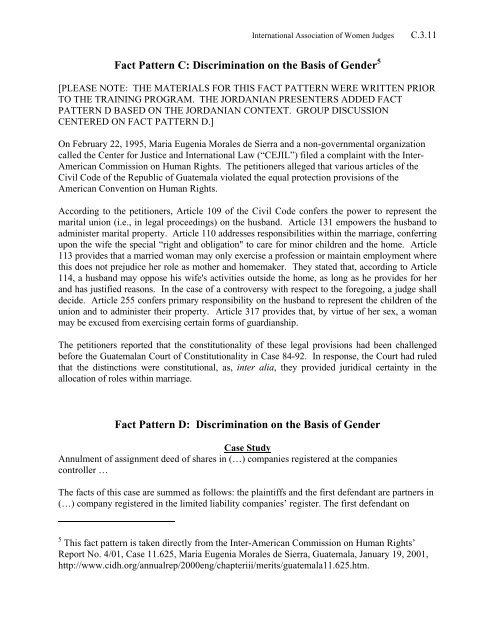Jurisprudence of Equality Program - PART - USAID
Jurisprudence of Equality Program - PART - USAID
Jurisprudence of Equality Program - PART - USAID
You also want an ePaper? Increase the reach of your titles
YUMPU automatically turns print PDFs into web optimized ePapers that Google loves.
International Association <strong>of</strong> Women Judges C.3.11<br />
Fact Pattern C: Discrimination on the Basis <strong>of</strong> Gender 5<br />
[PLEASE NOTE: THE MATERIALS FOR THIS FACT PATTERN WERE WRITTEN PRIOR<br />
TO THE TRAINING PROGRAM. THE JORDANIAN PRESENTERS ADDED FACT<br />
PATTERN D BASED ON THE JORDANIAN CONTEXT. GROUP DISCUSSION<br />
CENTERED ON FACT PATTERN D.]<br />
On February 22, 1995, Maria Eugenia Morales de Sierra and a non-governmental organization<br />
called the Center for Justice and International Law (“CEJIL”) filed a complaint with the Inter-<br />
American Commission on Human Rights. The petitioners alleged that various articles <strong>of</strong> the<br />
Civil Code <strong>of</strong> the Republic <strong>of</strong> Guatemala violated the equal protection provisions <strong>of</strong> the<br />
American Convention on Human Rights.<br />
According to the petitioners, Article 109 <strong>of</strong> the Civil Code confers the power to represent the<br />
marital union (i.e., in legal proceedings) on the husband. Article 131 empowers the husband to<br />
administer marital property. Article 110 addresses responsibilities within the marriage, conferring<br />
upon the wife the special “right and obligation" to care for minor children and the home. Article<br />
113 provides that a married woman may only exercise a pr<strong>of</strong>ession or maintain employment where<br />
this does not prejudice her role as mother and homemaker. They stated that, according to Article<br />
114, a husband may oppose his wife's activities outside the home, as long as he provides for her<br />
and has justified reasons. In the case <strong>of</strong> a controversy with respect to the foregoing, a judge shall<br />
decide. Article 255 confers primary responsibility on the husband to represent the children <strong>of</strong> the<br />
union and to administer their property. Article 317 provides that, by virtue <strong>of</strong> her sex, a woman<br />
may be excused from exercising certain forms <strong>of</strong> guardianship.<br />
The petitioners reported that the constitutionality <strong>of</strong> these legal provisions had been challenged<br />
before the Guatemalan Court <strong>of</strong> Constitutionality in Case 84-92. In response, the Court had ruled<br />
that the distinctions were constitutional, as, inter alia, they provided juridical certainty in the<br />
allocation <strong>of</strong> roles within marriage.<br />
Fact Pattern D: Discrimination on the Basis <strong>of</strong> Gender<br />
Case Study<br />
Annulment <strong>of</strong> assignment deed <strong>of</strong> shares in (…) companies registered at the companies<br />
controller …<br />
The facts <strong>of</strong> this case are summed as follows: the plaintiffs and the first defendant are partners in<br />
(…) company registered in the limited liability companies’ register. The first defendant on<br />
5 This fact pattern is taken directly from the Inter-American Commission on Human Rights’<br />
Report No. 4/01, Case 11.625, Maria Eugenia Morales de Sierra, Guatemala, January 19, 2001,<br />
http://www.cidh.org/annualrep/2000eng/chapteriii/merits/guatemala11.625.htm.

















